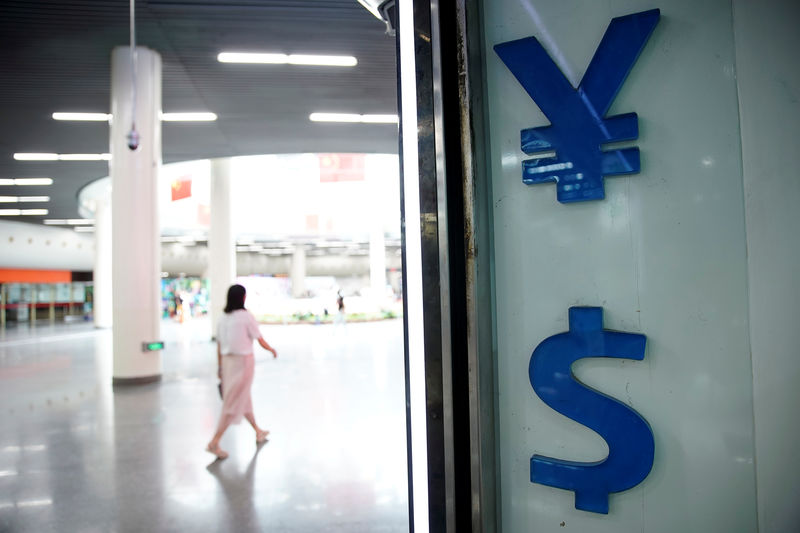By Samuel Shen and Andrew Galbraith
SHANGHAI (Reuters) - In a Shanghai room packed with small businesses ranging from furniture makers to garment exporters, Zhu Yuan, a currency expert at Bank of Communications, explains why Chinese companies need to build their defenses against currency volatility.
"Currency swings are now largely at the mercy of geopolitics and Sino-U.S. relations. The yuan's value is getting nearly impossible to predict," he told members of the city's chamber of commerce.
"Relatively volatile yuan fluctuations have exposed enterprises to big currency risks."
The yuan has fallen about 11 percent against the dollar since Washington announced its first hefty tariffs on Chinese imports 17 months ago.
The latest jolt came early this month, when authorities surprised markets by letting the yuan slide through the psychological support level of 7 to the dollar to decade lows, unsettling Chinese firms such as exporters and heavy borrowers of foreign debt.
Company executives listened with rapt attention as Zhu drew parallels with a house on sale to explain the basics of one hedging tool, a currency option. It's like putting down a deposit, he said, so that one has the right to buy the property in three months at a fixed price, no matter how prices change.
With no quick end to the trade war in sight, Chinese bankers, consultants and exchange operators are milking the opportunity to sell risk-mitigating tools that they claim will allow company bosses to sleep better at night.
"As the yuan cracks seven, uncertainty ahead will only increase," said Zhu Jianhua, a senior executive at commodities importer Shanhan Resources.
Currency volatility is relatively new for Chinese businesses. Until 2015, when Beijing adopted a more market-driven currency policy, the heavily managed yuan had been on an almost uninterrupted decade-long firming trend against the dollar.
Beijing's trade war with Washington since 2018 has spawned increased uncertainty and volatility.
At the end of 2018, only 230 China-listed companies - less than 7% of total - were engaged in hedging, as per their disclosures to the exchange. Analysts say that partly explains why earnings in China, and hence share prices, are more volatile than those in the United States.
According to an estimate by Industrial Bank Co, daily average trading in onshore yuan derivatives accounted for just 0.05% of the country's total import and export volumes in 2016. That compares with 0.9% in the United States, and 0.88% in Japan.
China Merchant Securities estimates that, if the yuan falls 3% against the dollar in 2019, China-listed airlines and other transport companies could be hit with a combined 5.6 billion yuan loss, equivalent to 4.3% of their net profit.
THE BUSINESS OF RISK
As the yuan's latest slide sparked fears the trade war could be broadening into a currency war, China's central bank urged companies to take precautions.
"We hope that companies don't expose themselves to currency risks too much," the People's Bank of China (PBOC) said in a statement on Aug. 5, hours after the yuan broke through the 7-mark.
It stressed companies should use derivatives to manage actual business risks, rather than making currency bets.
Seizing on concerns among Chinese trading firms and manufacturers, Zheshang Bank started promoting an online trading platform for yuan options. The lender ran advertisements saying yuan volatility could easily "reverse a company's fortune", "wipe out its profit", and "cause financial losses".
Liu Wencai, a former official at China's financial futures exchange and author of the book "the wisdom of risk-hedging", set up his own consultancy D-union in March to help companies manage market uncertainty.
"The trade war has boosted currency volatility, which has led to a burst in demand for risk-hedging," said Liu, who sees huge potential in a country where hedging expertise and tools are scarce.
In addition to embracing onshore hedging tools, an increasing number of Chinese firms are starting to access overseas derivative markets, which are often more liquid and less costly.
The Hong Kong Exchanges and Clearing Ltd (HKEX) (HK:0388) has seen rapid growth in the trading of futures and options involving the U.S. dollar and CNH, or offshore yuan. .
In 2018, as Sino-U.S. trade tensions intensified, HKEX's USD/CNH futures trading volume more than doubled from a year earlier to almost 1.8 million contracts, and has been rising this year. Average daily volume in June represented a 173% increase from 2017, HKEX said on its website.
The Singapore Exchange has also launched USD/CNH futures and options.
After heavy losses due to currency swings a few years ago, Golden Chemical Co, a Chinese chemical importer with annual overseas purchases of as much as $100 million, now uses both domestic and overseas derivative tools.

Jin Shengrong, its treasurer, said that since mid-2018, the company increased hedging activities, and "we therefore avoided quite substantial risks."